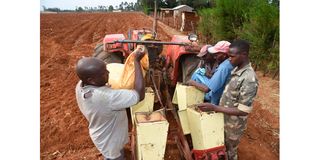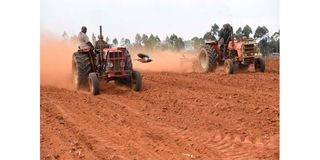Why many farmers in the North Rift may not plant this season

Farmers at Kabenes in Uasin Gishu County planting maize on March 30, 2022. They bought a 50 kilograms bag of fertilizer at Ksh6,000 and lamented that the cost of farm inputs has gone up. They prefer dry planting.
Many farmers in the North Rift region are scratching their heads and missing sleep due to the high cost of farm inputs and high fuel prices, as the rains start this planting season.
Many of them are still recovering from the aftershocks of the Covid-19 pandemic and may not be able to plant this season because they cannot afford the inputs and farming costs.
In Trans Nzoia and West Pokot counties, a 50kg bag of fertiliser now goes for Sh6,400, while a 25kg bag of maize seed sells for Sh5,000, translating to Sh200 per kilogram.
Subsidies appeal
Complaints about delays in importing of subsidised fertiliser come as several parts of the expansive North Rift are facing food shortages due to crop failure in the previous planting season following a drought.
Farmers are now appealing to the national government to enhance and expedite the supply of subsidised fertilisers and seeds to the farming community.
They say the government shows lack of concern, accusing it of abandoning them at the time of their greatest need and turning a deaf ear to their pleas.
Speaking in Chepchoina, Trans Nzoia on Wednesday, disgruntled farmers said farm input costs and shortages have affected both small-scale and large-scale farmers, and it was bound to affect productivity and result in a poor harvest.
Mr Antonio Mudongi, a large-scale farmer, said they are finding it hard to farm this season due to high costs of farm inputs.
Fuel prices
He decried high fuel prices, noting that tractors used in cultivating farms have become too expensive, charging Sh3,500 to plough an acre.
“The government should reduce fuel prices. Small-scale farmers are unable to buy fertiliser and many will be forced to reduce the acreage for crop production this season,” he said.

Farmers at a farm in Kabenes, Uasin Gishu County on March 30, 2022. They prefer dry planting.
Richard Mwareng, the chairperson of maize farmers in the region, said it is only by providing subsidised inputs that local farmers, including those who have quit cattle rustling, will realise their farming potential.
"Our people in West Pokot who heeded calls to end cattle rustling and chose farming are not able to plant, despite having prepared their land earlier due to high costs of seed and fertiliser," he said.
Cattle raids, he said, were the order of the day among the Pokot but they had reduced drastically after many warriors decided to take up farming as an alternative livelihood.
He decried delays in disbursing planting fertiliser for this year’s planting season and poor maize prices.
Many farmers, he said, need tractors to cultivate their farms.
“Farmers in lowlands like Kacheliba, Alale and Sigor should be given tractors for cultivation. We need AFC loans to support farmers,” he said.
He said the West Pokot county government gave farmers seeds for planting this April, but many have not planted because they don’t have fertiliser.
“Farmers should get fertiliser from the National Cereals and Produce Board,” he said, accusing Agriculture Cabinet Secretary Peter Munya of coming to the rescue of coffee and tea farmers while ignoring maize and milk farmers.
While some farmers have resorted to using organic fertiliser on their farms, those who are still waiting on the government may find it counterproductive as it is bound to affect farm yields.
“Some farmers have started planting with no fertiliser. How are they expected to produce good yields without fertiliser?” Mr Mwareng posed.
West Pokot Governor John Lonyangapuo, who is also a large-scale maize farmer, said many farmers in the country depend on subsidised fertilizer.
He predicts another episode of food shortages in the near future.
Kapenguria MP Samuel Moroto asked the Agriculture ministry to come clean on the status of farming in the region.
“They should tell us if they have plans to eradicate maize farming in the country. Otherwise why do we have all these problems affecting maize farmers?” he said.
“Many people in West Pokot County sell their animals just to buy a sack of maize. They will now be forced to go to Uganda to buy maize because many farmers are thinking about abandoning their farms this year,” he said.





